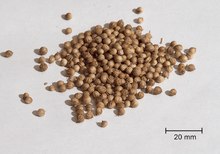coriander
English

Coriander seeds, dried.
Etymology
From Middle English coriandre, from Anglo-Norman coriandre, from Old French corïandre, from Latin coriandrum, from Ancient Greek κορίανδρον (koríandron), of uncertain origin.
Compare Ancient Greek κορίαννον (koríannon), κορίαμβλον (koríamblon), Mycenaean Greek [script needed] (ko-ri-a2-da-na), [script needed] (ko-ri-ja-da-na), [script needed] (ko-ri-ja-do-no), [script needed] (ko-ri-jo-da-na), and Akkadian 𒌑𒄷𒌷𒌝 (úḫurium).
Beekes supposes that cluster -dn- implies a Pre-Greek word, and hypothesizes that *koriaⁿdro- may have dissimilated to *koriaⁿdno-.
Doublet of cilantro.
Pronunciation
- (Received Pronunciation) IPA(key): /ˌkɒɹiˈændə/
- Rhymes: -ændə(ɹ)
Noun
coriander (usually uncountable, plural corianders)
- The annual herb Coriandrum sativum, used in many cuisines.
- The dried fruits thereof, used as a spice.
Synonyms
- (herb): Chinese parsley
- dhania
Meronyms
- (Coriandum sativum): cilantro (US, the leaves, when fresh); in other dialects, this, too, like the rest of the plant, is called coriander
Derived terms
Translations
Coriandrum sativum plant
|
|
dried seeds of Coriandrum sativum plant
|
Anagrams
This article is issued from
Wiktionary.
The text is licensed under Creative
Commons - Attribution - Sharealike.
Additional terms may apply for the media files.